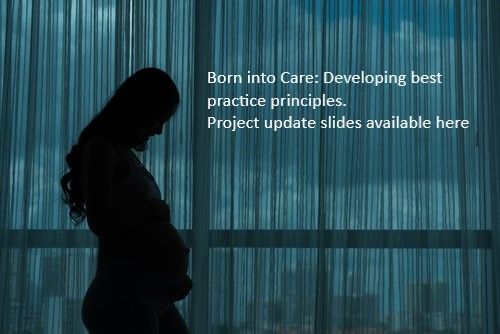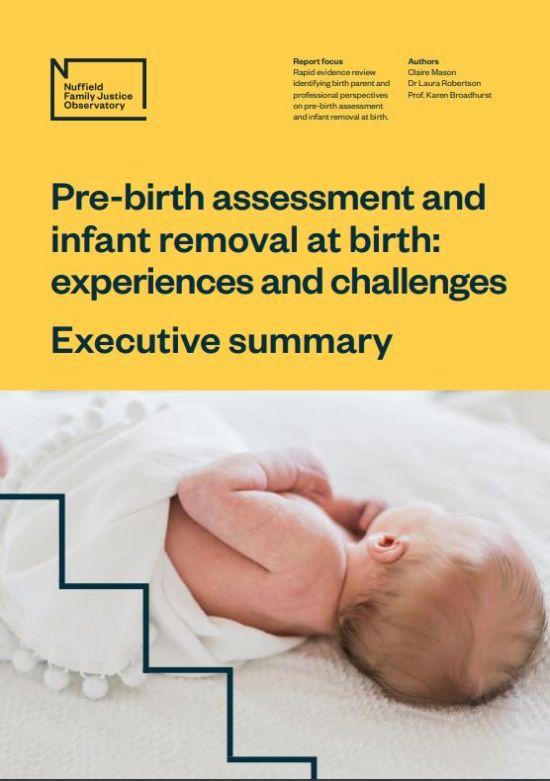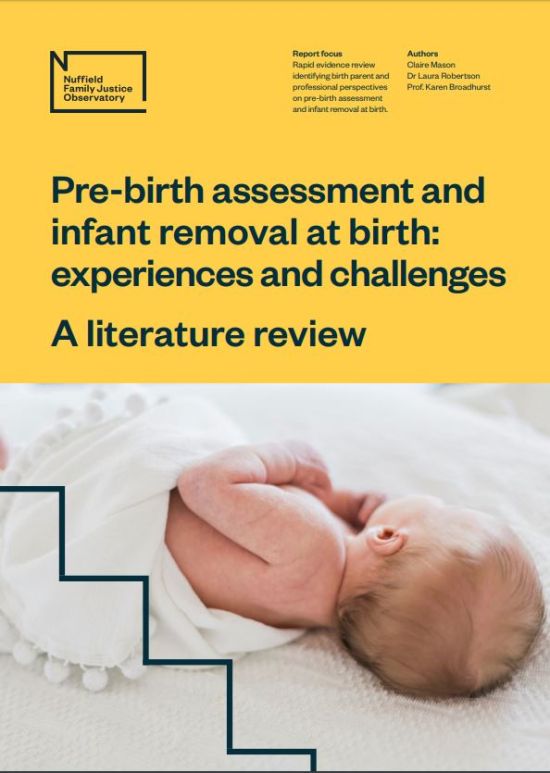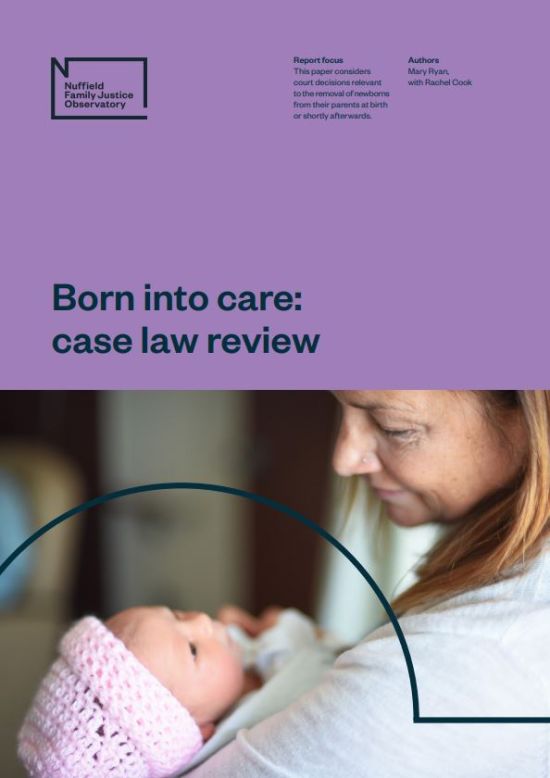Born into Care: Towards best practice guidelines when the State intervenes at birth
Project Dates
September 2019 - August 2022
Funder
The Nuffield Foundation
Project Summary
This research project will devise and test evidence informed best practice guidelines designed to inform practice when the State intervenes to protect infants at birth, through care proceedings. There are increasing national and international concerns about the volume of new-borns in care proceedings and safe, effective and ethical practice (Born into Care: England and Born into Care: Wales).
The project will take a participatory approach and bring together parents and wider family members as well as policy and practice stakeholders, to ensure the development of the new guidelines follows an inclusive process. The new best practice guidelines need to be closely attuned to the realities of everyday practice as well as child and family needs and experience. The project is being carried out as the first public law Special Interest Project for the Nuffield Family Justice Observatory (FJO) (https://www.nuffieldfjo.org.uk).
It will be delivered by researchers based at the Centre for Child and Family Justice Research at Lancaster University and the Rees Centre Oxford University led by Professor Karen Broadhurst and Claire Mason, in collaboration with international partners Dr Sarah Wise (University of Melbourne) and Dr Melissa O’Donnell (University of Western Australia). The project has appointed a multi-stakeholder advisory board and a dedicated birth mother advisory group to support this project. Peter Salem (AFCC) and Professor Jane Barlow (University of Oxford) are acting as expert scientific advisors to this project.
A detailed project information sheet is available here.
Project Update - February 2022
The full peer reviewed research report (full report and summary) and draft guidelines (available here), grounded in systematic research with 8 local authority areas and corresponding health trusts in England and Wales, have now been published (24th February 2022).
The research identified consensus among frontline practitioners and parents about what constitutes best practice when local authorities issue care proceedings at birth – but also uncovered numerous challenges, ranging from discontinuities, delays and resource constraints to risk adverse practice, shortfalls in a family-inclusive practice, insufficient professional specialism and poor inter-agency collaboration. The need for a more consistent sensitive approach to practice, underpinned by understandings of trauma is emphasised. The need for more training, supervision and support for professionals working in this emotionally challenging area of practice is also recommended.
The draft guidelines, grounded in the research include a series of aspirational statements for each stage of the parents’ journey and provide examples of how these statements can be translated into best practice. They consider how to overcome challenges at both a strategic level and in frontline practice. They also include examples of innovations from practice drawn from across England and Wales.
Between now and August 2022, the participating local authorities and NHS trusts are working with the team to test the feasibility of the guidelines. The intention is for the guidelines to be used as a basis for developing local area action plans and locality specific guidelines, within the context of national guidance. Findings from this feasibility study will inform a final version of the guidelines, which will be published later in 2022.
Two additional reviews undertaken as part of the research and led By colleagues at Rees Centre have also been published. The first, a review of guidance (available here) in eight participating local authorities covers professional practice concerning parent/infant separation within the first few days of life. Whilst the second, an evidence review of families’ experiences of perinatal loss (available here), identifies key messages that may be applicable to practice surrounding separation at birth. Both reports provide important background and context when considering improving practices surrounding separation at birth.
For further details, please contact Claire Mason (claire.mason@lancaster.ac.uk).
The 4 stages of the project
The diagram below depicts the 4 stages of the project which will run between 1st of September 2019 and the 31st of August 2022.
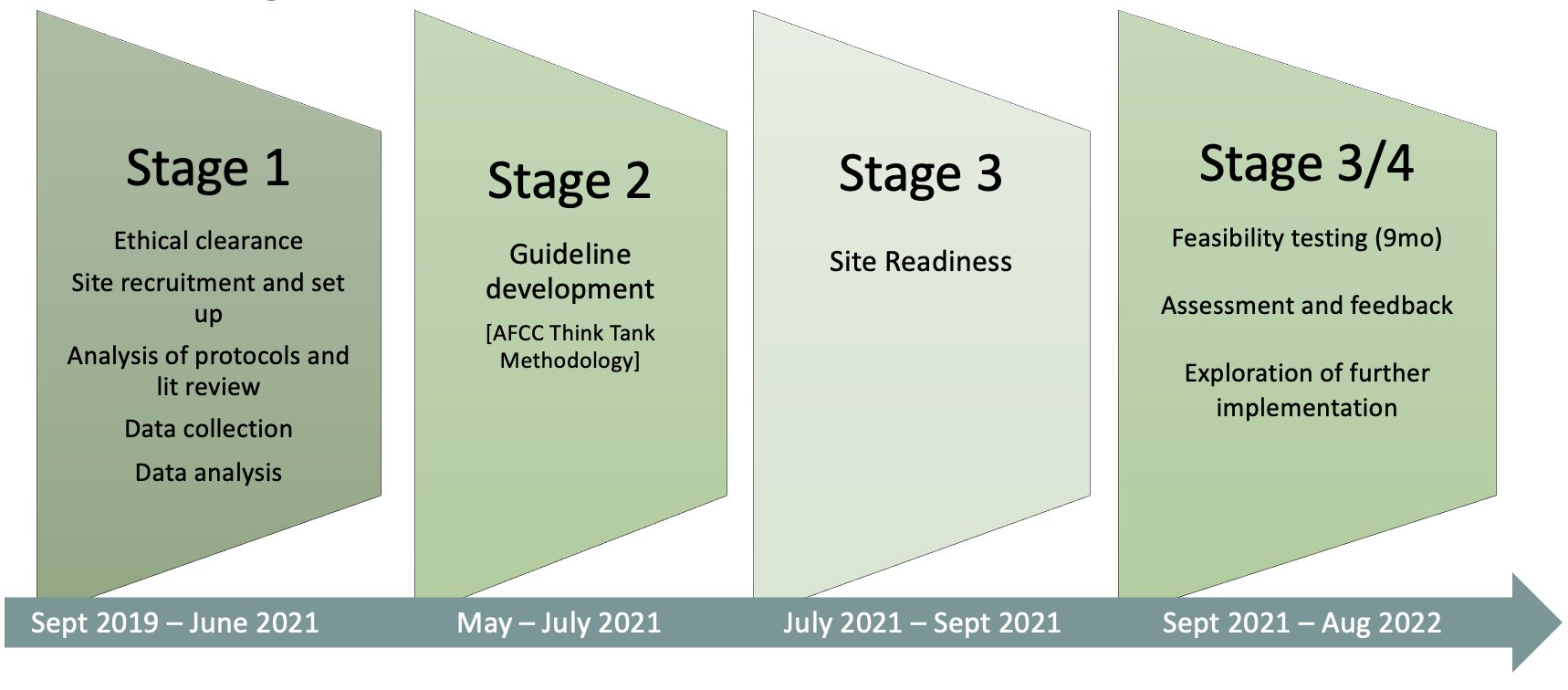
Publications
Mason, C., Broadhurst, K., Ward, H., Barnett, A. and Holmes, L. (2022) Born into Care: Draft best practice guidelines for when the state intervenes at birth. Nuffield Family Justice Observatory. (link)
Mason, C., Broadhurst, K., Ward, H., Barnett, A. and Holmes, L. (2022) Born into Care: Developing best practice guidelines for when the state intervenes at birth. Nuffield Family Justice Observatory. (full report and summary)
Broadhurst, K., Mason, C., Ward, H. (2022) Urgent care proceedings for new-born babies in England and Wales – time for a fundamental review. International Journal of Law, Policy and the Family, (Volume 36, Issue 1)
Ward, H., Broadhurst K., Mason, C. and Ott, E. (2022). Born into Care: Developing best practice guidelines when the state intervenes at birth: Review of current guidance documents. Rees Centre, University of Oxford. (link)
Mc Grath-Lone, L. and Ott, E. (2022.) Perinatal loss: key messages for infant removal at birth: An evidence review. Rees Centre, University of Oxford. (link)
Mason, C., Robertson, L. and Broadhurst, K. (2019) Pre-birth assessment and infant removal at birth: experiences and challenges, Nuffield Family Justice Observatory, London. (link)
Mason, C., Robertson, L. and Broadhurst, K. (2019) Pre-birth assessment and infant removal at birth: experiences and challenges, Executive Summary, Nuffield Family Justice Observatory, London. (link)
Ryan, M. with Cook, R. (2019) Born into Care: Case Law Review, Nuffield Family Justice Observatory, London. (link)
Research Team
Professor Karen Broadhurst, Principal Investigator, Lancaster University
Claire Mason, Co-Investigator/Research Fellow, Lancaster University
Dr Anna Barnett, Project Officer, Lancaster University
Dr Lisa Holmes, Research Fellow, Rees Centre, Oxford University
Professor Harriet Ward, Consultant, Rees Centre, Oxford University
Dr Sarah Wise, Research Fellow, University of Melbourne
Dr Melissa O’Donnell, Research Fellow, University of Western Australia
Advisory Board
Sally Jenkins (Chair), Head Of Children and Families Services, Newport City Council
Rebecca Brione, Research and Partnerships Officer, Birthrights
Angela Frazer Wicks, Co-Chair, Your Family Your Voice
Cathy Ashley, Chief Exec, Family Rights Group
Laura Bridle, Perinatal mental health midwife, Guy's and St Thomas' NHS Foundation Trust (Royal College of Midwifery rep)
Deborah Woodcock, Director of Operations and Principal Social Worker, Stockport Council
Julie Evans, Senior Midwife, Cwm Taf Morgannwg University Health Board, Early Years Vulnerability Profiling Officer (seconded Rhondda Cynon Taf County Borough Council)
Sir Michael Keehan, QC, High Court Judge
Lisa Harker, Director, Nuffield Family Justice Observatory
Pam Ledward, Family Rights Group
HHJ Mererid Edwards, Welsh Circuit Judge
Melissa Van Dyke, International Advisor on Implementation, Centre for Excellence for Children's Care and Protection, Strathclyde University
Naomi Delap, Director, Birth Companions
Helen Harding, Head of Service Early Help, London Borough of Havering (ADCS rep)
Nigel Brown, Chief Executive, Cafcass Cymru
Melanie Carew, Head of Legal, Cafcass
Trudi Seneviratne, Consultant Adult and Perinatal Psychiatrist
Wendy Marsh, Deputy Director of Midwifery, Portsmouth Hospitals Trust
Contact
For further information please contact Claire Mason (c.mason@lancaster.ac.uk)


